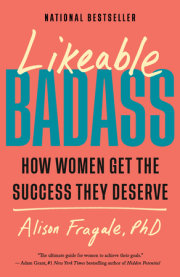Chapter 1Ladies, We Have a Status Problem"We want it to be solution-focused.”
Until I heard those six words, I was only half listening. This was pre-Zoom, back when all meetings were in person. I couldn’t multitask by internet shopping, so I was taking a mental inventory of the dinner options in my refrigerator. My business school colleagues were talking with representatives of a national bank about a leadership program for the bank’s up-and-comers. I was one of the faculty scheduled to teach in the program, and my role in this meeting was limited: I introduced myself, cracked a joke to reassure the client that I had the stage presence to handle their hard-charging, type-A, take-no-prisoners audience, nodded as my colleagues spoke, and waited to see if anyone had questions about my session. I’ve taken this type of meeting countless times over the years: Sit, nod, joke, repeat.
Then came the sentence that snapped me back to attention. Solution-focused? It was a line I had never heard cross a client’s lips. In most ways, this leadership program was the same as many others that had come before it. But in one very important way, it was a first—this leadership program was solely for
women. Until that point in my career, I would occasionally work with a corporate audience that was 50 percent women, but just as often I was the only woman in the room. Rare was the client that had enough women to fill a room and was invested enough in their development to create a program just for them.
“Solution” struck me because it implied that these women had a problem. I was equally struck that I immediately understood what they meant. They didn’t want me to gather these top-performing women so they could complain about how difficult it was working in the “old boys’ club” of financial services. Rather, they wanted me to offer specific, practical advice about “succeeding while female.” Still, their tone was defeatist, as if they were asking for solutions they didn’t think existed. Surely, women’s problems were so numerous, so enduring, and so rooted in systemic bias, they seemed to be saying, there was little I could do to solve them in three hours. Despite investing significant time and money developing this program, I got the sense they didn’t think it could deliver results.
At this point, I spoke up. Yes, women play an unfair game, I said, and they probably always will. But that doesn’t mean they can’t win. They can, and I was just the person to show them how.
It’s Time to Change the GameI love nothing more than translating the science of my field—organizational psychology—into actionable advice that helps people, especially women, live and work better. Although it feels like women face a million sources of disadvantage relative to men, they face only two: a lack of
power and a lack of
status. These are big challenges, no doubt. But, having studied power and status for over twenty years, I assure you that women can triumph in the face of these problems—if we focus on the right one. Spoiler alert: It’s not the one you think it is.
Your
power is your control over resources—like money, authority, and a seat at the table where decisions are made. Despite decades of attention to closing the gaps, women continue to lag men on all these dimensions. I could cite depressing power statistics for days, but here are a few of my favorites:
At the current rate of progress, the global gender pay gap will persist for 169 more years, even though women in many countries are more educated than their male peers and are consistently rated as equal or better leaders.
When transgender people transition from male to female, their pay drops about one-third. In contrast, those who transition from female to male continue to earn as much or more after transition as they did before.
Women are significantly less likely than men to be promoted from entry-level to first-time manager, a finding known as the “broken rung.” For every 100 men promoted to manager in 2023, only 87 women were promoted. For Black women, that number dropped to 54 promotions per 100 male counterparts.
Your
status, on the other hand, is the way others see you—specifically, how much you’re respected, admired, and valued. Women are disadvantaged here, too. We are disproportionately denied opportunities to have our ideas and contributions presented, acknowledged, and rewarded. Take interruptions, as just one example. When you’re interrupted, you’re literally silenced. Interruptions deny the speaker an opportunity for influence and are a subtle, important way that we communicate how much we value others’ contributions. When Tonja Jacobi and Dylan Schweers studied eleven years of conversations in a nine-person workgroup, they found that the women were disproportionately silenced. A quarter of the group members were women, and they did 25 percent of the talking, but accounted for a third of the interruptions. Only three individuals in the group were interrupted more than a hundred times, and all three were women. What makes these findings particularly noteworthy is the prestige of the specific workgroup in question: the United States Supreme Court. Despite their credentials and objective success, Justices Ruth Bader Ginsburg, Sonia Sotomayor, and Elena Kagan were all interrupted significantly more than their male colleagues. As the brilliant Stanford sociologist Cecilia Ridgeway eloquently stated, even “powerful women are disadvantaged by gender status beliefs compared to their . . . powerful male peers.” And women’s status woes aren’t limited to losing the mic. When we’re not fending off microaggressions, we’re hepeated, mansplained, undervalued, and overlooked: all ways the status problem rears its ugly head.
We need to solve both problems, of course. Power and status are two of only a few “fundamental human needs.” Like our needs for social interaction and intellectual challenge, our desires to “have control” and “be respected” are universal motivators that drive us and define our quality of life. When our aspirations for power and status are thwarted, the negative consequences are far-reaching, impacting everything from our mental health to our reproductive success. Both physically and psychologically, lacking control and feeling disrespected are just as damaging as living a life without friends.
Despite their equal importance to our life satisfaction, however, there’s one glaring difference between them. Both as individuals and as a society, we have primarily focused—perhaps overfocused—on increasing women’s power, while neglecting their status.
In their groundbreaking book
The Power Code, acclaimed journalists Katty Kay and Claire Shipman acknowledge the importance of status for women, but astutely label it one of
“power’s underrated cousins.” We see evidence of this everywhere we turn. I chuckled when this post from digital health strategist Lauren Howard crossed my LinkedIn feed:
Women really only want three things:1.Equal pay.
2.Respect.
3.Pockets.
I agreed with the general sentiment but found the order telling. Although they both make the cut, power is #1 and status is #2.*
I get the logic: Respect and regard are nice to have, but they don’t pay the bills. Like mine, I’m sure your daily to-do list is never-ending and when you know you can’t accomplish everything, you triage your efforts to achieve your top priorities. We’ve traditionally made the same calculation with power and status. Forget respect, just pay me (and promote me while you’re at it).
Consider the advice published by two of the most influential sources for personal and professional wisdom today:
Harvard Business Review and TED. I searched both for power and status content related to women or gender and the results were stark. In every format, we devote significantly more attention to power than status:
search termsWomen/Gender and PowerWomen/Gender and Respect/StatusHarvard Business ReviewBook
43
3
Case Study
158
44
Digital Article
118
66
Magazine Article
41
6
Magazine Issue
12
0
TEDTalks
608
388
Playlists
14
3
Blog Posts
397
226
TEDx Events
144
55
* For what it’s worth, I also think “comfortable shoes” deserves to be on the list.
We keep the focus on power in other ways as well, such as acknowledging annual milestones like “equal pay day,” the day into the current calendar year that the average woman must work to earn what the average man earned the year before. And many organizations have been created to increase women’s power in the workforce. For example, 81cents, a nonprofit founded by Jordan Sale, matches women with expert volunteer coaches to help them negotiate their job offers, and First Women’s Bank in Chicago was created to address the gender disparity in business funding, with a mission to get more capital into the hands of female entrepreneurs. Many volunteers lend their time and talent to supporting these organizations, including me; I sit on the advisory board of First Women’s Bank. In contrast, I know of no organizations created with the mission of helping women get more respect, and no holidays to bring global awareness to the issue.
The problem with this “power first, status second” mentality is that it contradicts the science. Research shows that power is awarded
based on status. Technically, you can obtain power by force, but few among us are dictators. If a person has power, it’s almost always because someone else has given it to them—the title, the authority, the budget, the autonomy, the paycheck. If you were going to grant someone control over you, perhaps by accepting a job as their subordinate or electing them to be the captain of your sports team or the president of your neighborhood association, what kind of person would you pick? You would pick someone you
respected, someone you
admired, someone you thought would use their power responsibly and for good. That is, you would pick someone you judged to have high
status. When we look at the research, we see evidence that this is what everyone does. In short,
resources follow respect.When we bring status into the equation, women’s long-standing struggles to achieve the power they deserve, while still infuriating, start to make sense.
Copyright © 2024 by Alison Fragale. All rights reserved. No part of this excerpt may be reproduced or reprinted without permission in writing from the publisher.








